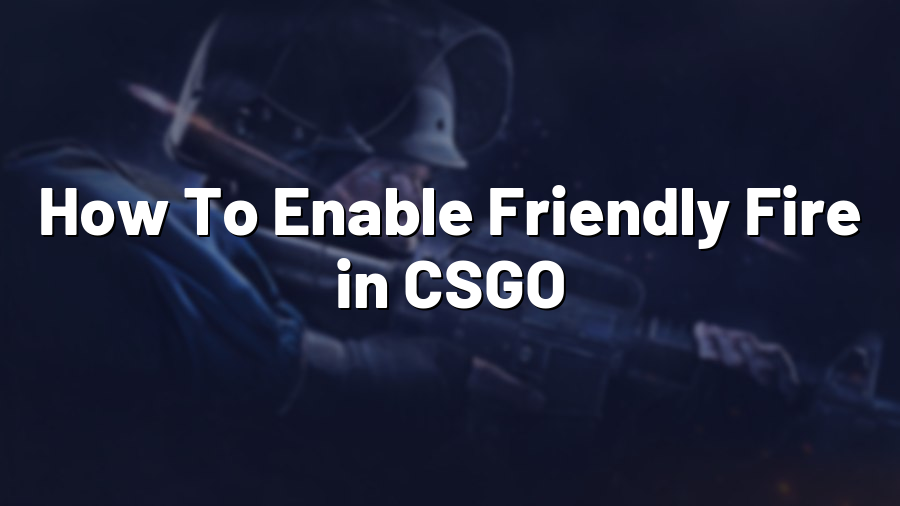BFN Lab: Insights and Innovations
Explore the latest trends and insights in technology, science, and innovation at BFN Lab.
When Teamkill Penalties Turn Allies into Enemies
Discover how teamkill penalties can transform allies into fierce enemies and unravel teamwork in your favorite games!
Understanding Teamkill Penalties: How Friendly Fire Diminishes Team Cohesion
Understanding Teamkill Penalties is crucial for any team-based game, as friendly fire incidents can have a profound impact on overall team cohesion. When a player unintentionally or intentionally harms their teammates, it not only affects the immediate gameplay but also sows discord within the team. Such actions lead to teamkill penalties, which are often enforced by game developers to discourage reckless behavior. Players need to recognize that these penalties serve a dual purpose: they promote fair play and help to foster a more united team atmosphere, ultimately enhancing the gaming experience for everyone involved.
Moreover, the presence of teamkill penalties encourages players to communicate effectively and strategize more carefully. By avoiding friendly fire incidents, teams can maintain a higher level of morale and trust, making it easier to coordinate tactics during crucial moments of the game. When players understand the consequences of their actions and the significance of teamwork, they are more likely to develop a stronger bond and collaborate efficiently. In summary, acknowledging the implications of friendly fire and adhering to teamkill penalties is essential for maintaining team synergy and achieving collective success.

Counter-Strike is a popular tactical first-person shooter game that pits two teams against each other: the Terrorists and the Counter-Terrorists. Players must work together to achieve objectives, such as planting or defusing bombs, or rescuing hostages. For players looking to enhance their gaming experience, CS2-Gehäuseöffnung offers exciting ways to unlock new skins and weapons.
The Psychology Behind Teamkill Penalties: Turning Allies into Adversaries
In the competitive world of online gaming, teamkill penalties serve not only as a deterrent but also as a reflection of the psychology behind player interactions. These penalties arise when a player intentionally harms or eliminates an ally, transforming a potential cooperative experience into one fraught with tension. The fundamental mechanisms at play include trust and camaraderie, which are crucial for maintaining a positive team dynamic. When a gamer decides to engage in teamkilling, it not only jeopardizes the immediate gameplay but also shatters the underlying social contract that exists between players, resulting in a noticeable shift from a united front to distrust between teammates.
Moreover, the repercussions of teamkill penalties extend beyond the game itself, influencing player behavior as they navigate the social dynamics of multiplayer environments. When players face penalties for teamkills, it forces them to reevaluate their actions and motivations. This can lead to heightened tensions, where former allies may start to view each other as adversaries, akin to a paranoid state that complicates real-time decision-making. Ultimately, understanding the psychology behind these penalties sheds light on the delicate balance of cooperation and competition in gaming, emphasizing how swiftly interactions can devolve into conflict when trust is compromised.
Is Friendly Fire Really the Enemy? Analyzing Teamkill Penalty Dynamics
The term friendly fire often evokes a sense of frustration and betrayal in gaming communities. What many might overlook is how this phenomenon impacts team dynamics and player behavior. In competitive environments, the teamkill penalty serves as a crucial mechanic designed to deter players from intentionally harming their teammates. However, the effectiveness of these penalties varies widely across different games, raising questions about whether they truly serve as a deterrent or merely complicate the gaming experience. Analyzing teamkill penalties reveals a complex interplay between player accountability and the need for collaboration, often leading to heated discussions within the community.
Further examination of the teamkill penalty dynamics suggests that while penalties can promote cautious gameplay, they can also result in unintended consequences. For instance, players may become overly defensive, fearing the repercussions of an accident and inadvertently leading to a breakdown of teamwork. It's essential to consider if these penalties foster a culture of collaboration or instill a sense of paranoia among players. As we dive deeper into the mechanics and community feedback surrounding friendly fire, it becomes apparent that understanding its implications is necessary for creating a more harmonious online environment.